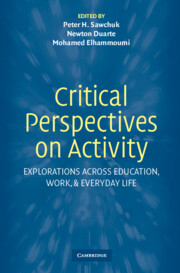Book contents
- Frontmatter
- Contents
- List of Contributors
- Foreword by Seth Chaiklin
- Acknowledgements
- 1 Introduction: Exploring Activity Across Education, Work, and Everyday Life
- SECTION I CRITICAL PERSPECTIVES ON THEORY
- 2 Is There a Marxist Psychology?
- 3 The Cultural–Historical Activity Theory: Some Aspects of Development
- 4 Epistemological Scepticism, Complacent Irony: Investigations Concerning the Neo-Pragmatism of Richard Rorty
- SECTION II EDUCATION
- SECTION III WORK
- SECTION IV EVERYDAY LIFE
- References
- Index
2 - Is There a Marxist Psychology?
Published online by Cambridge University Press: 10 December 2009
- Frontmatter
- Contents
- List of Contributors
- Foreword by Seth Chaiklin
- Acknowledgements
- 1 Introduction: Exploring Activity Across Education, Work, and Everyday Life
- SECTION I CRITICAL PERSPECTIVES ON THEORY
- 2 Is There a Marxist Psychology?
- 3 The Cultural–Historical Activity Theory: Some Aspects of Development
- 4 Epistemological Scepticism, Complacent Irony: Investigations Concerning the Neo-Pragmatism of Richard Rorty
- SECTION II EDUCATION
- SECTION III WORK
- SECTION IV EVERYDAY LIFE
- References
- Index
Summary
We do not want a brand-new and trivial name from history. We want a name covered by the dust of centuries. We regard this as our historical right, as an indication of our historical role, our claim to realize psychology as a science. We must view ourselves in connection with and in relation to the past … That is why we accept the name of our science with all its age-old delusions as a vivid reminder of our victory over these errors, as the fighting scars of wounds, as a vivid testimony of the truth which develops in the incredibly complicated struggle with falsehood.
(Vygotsky, 1927/1997a: 336–337)La psychologie ne détient donc nullement le “secret” des faits humains, simplement parce que ce “secret” n'est pas d'ordre psychologique [Psychology by no means holds the “secret” of human affairs, simply because this “secret” is not of a psychological order].
(Politzer, 1928: 170)Pourquoi la théorie? Comme le plus court chemin vers la realité.
(Verret, 1999: 10)INTRODUCTION
Vygotsky, whose premature death occurred at the age of thirty-seven in 1934, was a serious loss to Marxist psychology. He will be remembered for three things. Firstly, he played a major part in reviving the Marxist approach to psychology, which had been suppressed by the positivism–scientism versions of Marxism. Secondly, in his major works, Vygotsky made a positive and original application of Marx's method, which in Marx's works often suffered from vulgar dialectical materialism.
- Type
- Chapter
- Information
- Critical Perspectives on ActivityExplorations Across Education, Work, and Everyday Life, pp. 23 - 34Publisher: Cambridge University PressPrint publication year: 2006
- 1
- Cited by



